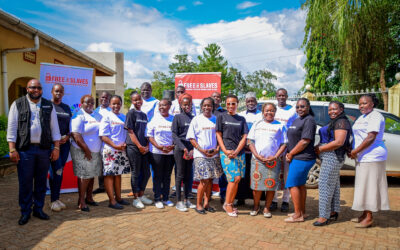More than 40 sustainable, socially responsible, and faith-based investment groups, who manage over $450 billion in assets, are voicing support today for new requirements that U.S. companies disclose if their products contain “conflict minerals” from central Africa.
One year from today, businesses must file their first disclosures with the U.S. Securities and Exchange Commission (SEC) under the Conflict Mineral Rule. Companies must investigate if their products contain tin, tungsten, tantalum or gold from the Democratic Republic of the Congo (DRC) or neighboring countries, and if profits from those minerals have supported armed groups in the region. Learn more about the rule here.
Free the Slaves has demonstrated that slavery is widespread at Congo mines. The minerals that slaves produce are widely used in the production of jewelry and electronic products such as cell phones, computers and medical devices. Learn about FTS Congo research here.
“Given that the long standing conflict in the Democratic Republic of the Congo has claimed more than 5 million lives and contributed to egregious human rights abuses such as rape, child soldiers and slave labor, we believe companies must disclose their use of conflict minerals,” the investors wrote.

Children and adults are forced to work at mines in the DRC | Photo: FTS/Callahan
“We believe it is important to protect investors through improved disclosure and reporting on social risk factors such as labor practices and human rights. Requiring disclosure within a company’s supply chain allows investors to evaluate supply chain policies and practices, to make company to company comparisons, and to calculate the level of risk associated with conflict mineral sourcing, and to provide assurance that companies are not engaging in destabilizing activities,” the letter states. Read the full letter here on the website of the Responsible Sourcing Network.
The investor letter frames support for the Conflict Mineral Rule in economic terms, because three industry associations are challenging the disclosure requirement in court. The U.S. Chamber of Commerce, National Association of Manufacturers and Business Roundtable claim the SEC did not prove that the economic benefits of the regulation justify the costs of compliance by corporations. A suit to block the rule is pending in federal court. Oral arguments are scheduled for July 1. Read about the case here.
In the statement released today, investors express disagreement with the lawsuit. They conclude that “any stay in legislation would hinder a much needed leverage point to address one of the root causes of the ongoing violence that has plagued the Congo for many years.”
Advocates for corporate accountability are closely monitoring the legal battle over the Conflict Mineral Rule because it has implications for efforts to require broader business disclosure involving all raw materials in product supply chains, and all forms of slavery worldwide.
“Disclosure is important because it motivates companies to ask themselves questions they have never asked before about their business partners,” says FTS Director of Programs Karen Stauss.
The SEC rule targeting conflict minerals from the Congo is already having an impact, Stauss says, because many companies have begun to focus on potential solutions even as the legal challenge to the regulation unfolds in court.


